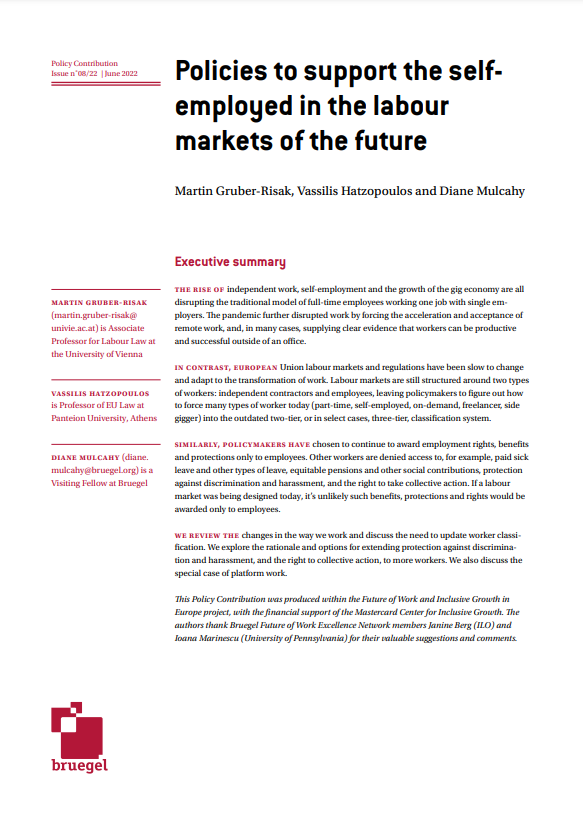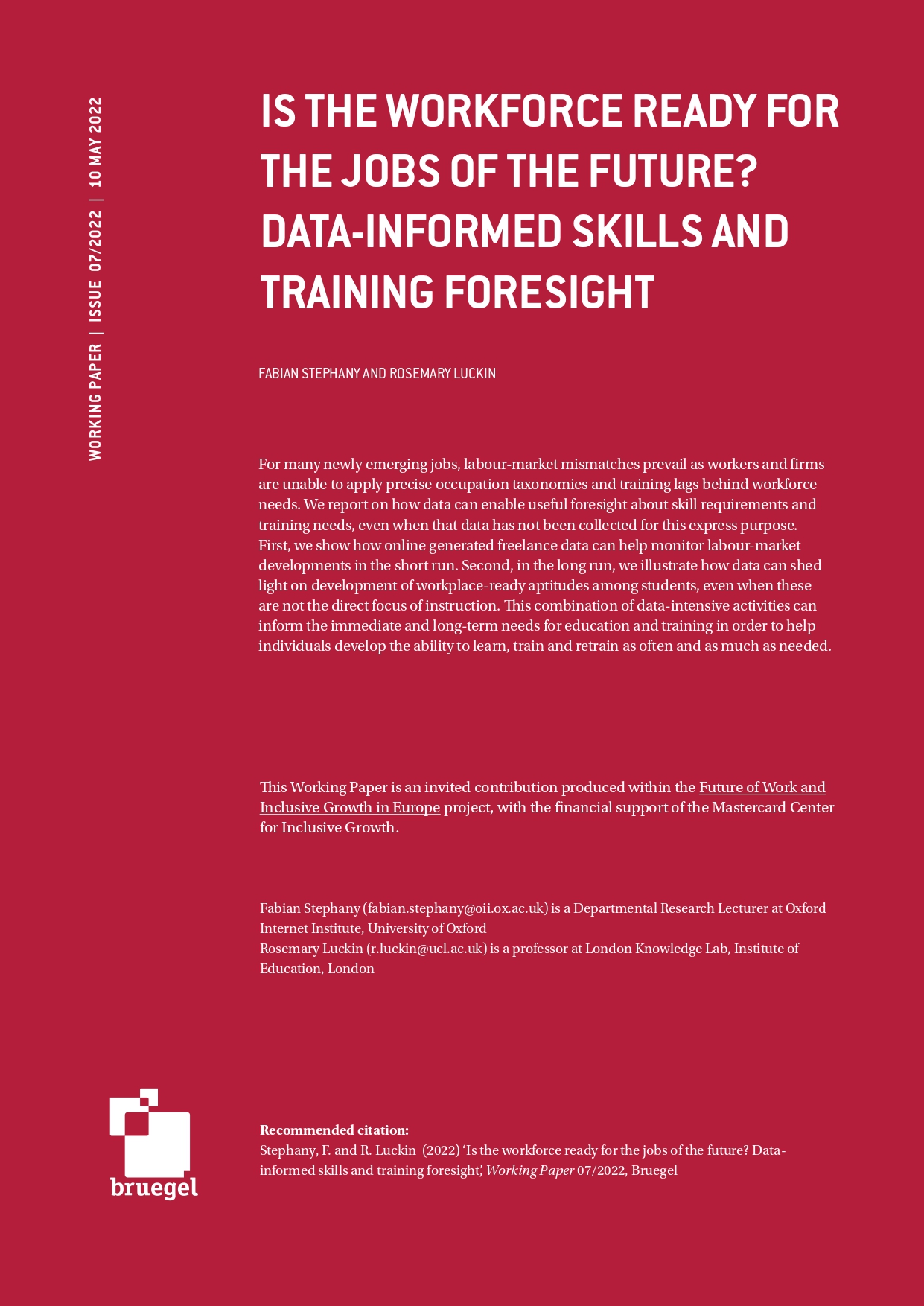Blog Post
Making antitrust work for, not against, gig workers and the self-employed
Policymakers should act to deal with labour-market concentration trends that potentially harm workers, especially gig workers and the self-employed.
In late September, the Chair of United States Federal Trade Commission, Lina Khan, urged Congress to consider passing legislation to ensure gig workers who organise do not fall foul of antitrust laws. The European Union has already taken some steps in this direction. In a 2019 statement, European Commission Vice President Margrethe Vestager said that “we need to make sure that there is nothing in the competition rules to stop those platform workers from forming a union, to negotiate proper wages as you would do in any other business”. This was followed by a consultation with social partners on the working conditions of platform workers, and, in early 2021, by further discussions on collective bargaining agreements for the self-employed and the scope of application of EU competition rules. The European Commission is currently looking at how to ensure that EU competition law does not prevent initiatives that improve the working conditions of platform and other self-employed workers through collective agreements.
Such policy initiatives are needed. Evidence from the US suggests that labour market concentration has increased in the last few decades. This has increased employers’ monopsony power: their ability to set wages below workers’ productivity levels and to impose work conditions without adequate protection. The rise of monopsony power is also found to be associated with the decline of the labour share of GDP and increasing income inequality. Among the most vulnerable in the face of these trends are the gig workers and, more generally, the self-employed. They typically lack the bargaining power needed to improve their work conditions.
Gig workers: employees or independent contractors?
Platform work is steadily rising in the EU. According to the first and second Collaborative Economy and Employment (COLLEEM) surveys, 11.9% of internet users between the ages of 16 and 74 in 14 EU countries have earned income at least once by providing a service via an online platform. When adjusting for internet usage, this figure corresponds to 9.7% of the total population aged between 16 and 74, or around 37 million people. In terms of frequency, 7.7% of the population aged between 16 and 74 work via a platform at least once a month, and 5.6% regularly work via platforms for ten or more hours per week. However, only 1.4% rely on platform work for their main employment.
The employment status of platform workers depends on the labour law and structure of each country. However, there has been some recent convergence in the rules for platform business models that exert high levels of control over workers’ services. In September 2020, a Dutch court found that Uber drivers were employees and therefore have the right to collective bargaining without any violation of antitrust rules. In February 2020, an Italian court reached the same decision for workers on food delivery platforms, while Spain recently passed a new law also classifying them as employees.
However, these are specific cases for specific platform business models in a few EU countries. EU gig workers, in general, are considered self-employed, even when they are economically dependent on the platform. For example, employee rights for app-based delivery workers in Greece, the country with by far the highest self-employment rate in the EU and the fourth highest in the OECD, are far from adequate as illustrated by the recent Efood case.
Most US gig workers are also considered self-employed. California in 2019 passed Assembly Bill 5 in an attempt to classify them as employees, but the bill ended up having limited coverage because of intense lobbying by platforms, which led to the Proposition 22 initiative, which excluded app-based transportation and delivery workers from the bill, though with some additional protections they did not have before.
So, in most of cases, the contracts of platform workers typically classify them as self-employed contractors.
Antitrust and self-employed contractors
Under EU antitrust law, self-employed contractors are considered to be ‘undertakings’. Under the EU Treaty, any agreements between undertakings that aims to prevent, restrict or distort market competition is (in principle) illegal. Within these agreements, particular attention is paid to cartels, in which undertakings agree to fix prices above the competitive level, thereby harming social welfare.
One particular concern is working conditions for self-employed workers. Certain types of such non-standard work are associated with precarious working conditions, inadequate access to social protection, opaque contractual arrangements and health and safety risks.
One way to mitigate these concerns would be to develop a framework in which non-standard workers can bargain collectively over their working conditions. By increasing their collective bargaining power, workers can claim more rights and benefits that improve their working conditions. This also allows for a more equitable allocation of the value creation of platform services.
However, current antitrust law obstructs such collective bargaining initiatives. Since non-standard workers are considered in the EU as ‘undertakings’, collective bargaining agreements (especially when they include compensation arrangements) are considered in competition law as wage-fixing (price-fixing) cartels and are therefore, in principle, illegal.
While US antitrust laws (the Sherman Act and Clayton Act) follow a somewhat different approach to the EU on labour issues, in principle collective bargaining agreements by self-employed workers are in the US also antitrust violations.
Hence, improving working conditions for these workers through collective agreements in principle violates competition law.
Updating antitrust based on the equity objective
The solution requires updating antitrust such that EU competition law does not block initiatives to improve working conditions through collective agreements.
The scope of competition law has traditionally been based on the efficiency objective (as a means to achieve greater consumer welfare). For example, in the EU, an agreement between undertakings that has as an object or effect the restriction of competition may be allowed if: i) it leads to substantial efficiency gains; ii) the practice is necessary in order to achieve these efficiency gains; iii) a fair share of these efficiency gains is allocated to consumers, and; iv) it does not completely eliminate competition.
However, collective bargaining is based instead on the equity objective, by allowing workers to claim more benefits from the value they create in the platform market. This requires a rethink of how antitrust is applied in such a case, as workers’ welfare is also important for the functioning of labour and product markets.
The European Commission’s consultation earlier this year included four options for how to achieve this. They vary in terms of coverage. The narrowest option would be to update competition law to allow only collective agreements by platform workers, while the remaining broader options would also include self-employed people beyond platform workers.
Priority should be given to resolving the conflict between EU competition policy and collective bargaining rights for dependent self-employed workers, that is “workers who provide work or perform services to other persons within the legal framework of a civil or commercial contract, but who in fact are dependent on or integrated into the firm for which they perform the work or provide the service in question”. This can include platform work models (depending on the business model of the platform) but it also goes further by including other self-employed workers depending on the characteristics of their working relationships with firms. So, a broader perspective should be adopted, rather than focusing only on platform workers.
Whether self-employed workers are dependent depends on the degree of control the platform/firm exerts over the provision of their service. If, for example, the platform/firm sets the final price of workers’ services and defines the conditions by which the service will be provided, it is more likely workers will be in dependent self-employment.
A second criterion is independent supply: can workers provide the same service outside the platform (according to the Uber Pop drivers ruling, this option did not exist due to legal restrictions)? If workers cannot supply their services independently, they are more dependent on the platform.
Last, the economic dependence of self-employed workers on platforms and firms can be another criterion to consider. How much of their income do platform workers derive by providing services through the platform/firm? Spain and Germany currently have in place, in addition to employees and self-employed workers, a third category of dependent self-employed workers (with income contribution thresholds of 75% and 50%, respectively) with greater benefits and worker protections but short of employee status.
In light of the European Pillar of Social Rights, gig and other self-employed workers should have access to more tools and rights that will allow for a fairer distribution of the value generated by their work. The right to participate in collective bargaining agreements should be viewed as a fundamental for self-employed workers who depend to some extent on specific firms and platforms for the provision of their work.
Recommended citation:
Petropoulos, G. (2021) ‘Making antitrust work for, not against, gig workers and the self-employed’, Bruegel Blog, 11 October
Republishing and referencing
Bruegel considers itself a public good and takes no institutional standpoint. Anyone is free to republish and/or quote this post without prior consent. Please provide a full reference, clearly stating Bruegel and the relevant author as the source, and include a prominent hyperlink to the original post.






